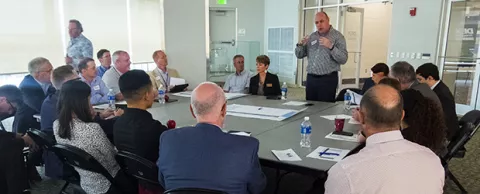
We were in Orlando this week to deliver our second Smart Cities Council Readiness Challenge Grant workshop. Orlando is one of the five winners of this year’s grants and it has a problem that most cities would be envious of: A thriving economy.
Creating more than 100,000 jobs over the past two years doesn’t seem like a problem, especially when they’re generally high-tech, high-paying jobs. But there are consequences. Every new job brings a new resident. How do you keep traffic moving? How do you keep people safe? Where do all the people live, especially those who have the skills only for lower-paying jobs?
Those were the questions participants worked through at the city’s workshop. The Council led them through a variety of exercises to come up with quick wins and long-term initiatives to make a difference for residents and visitors to the city. We’ll continue to share their progress with you. — Kevin Ebi
When most people think of Orlando they think of theme parks, but the overwhelming majority of the economy is driven by high technology. Life sciences. Software development. Electronics engineering.
And that huge slice of the economy is getting even bigger. Over the past two years, the city has added more than 100,000 jobs. The population has grown by about the same amount. Orlando used its Smart Cities Council Readiness Challenge Grant workshop to help devise strategies to grow smarter.
“We want to become the world’s most intelligent, interconnected and efficient city,” Orlando Mayor Buddy Dyer said in kicking off the workshop. “We want to become a showcase city for smart city technology.”
Investing in smart growth
Orlando is spending $15 billion on infrastructure, including rebuilding Interstate 4, which cuts through downtown, and expanding its airport and seaport. It wants to be smart about those projects so that it can get the most from its investments.
"As a government we don't have unlimited funding,” said Chief Information Officer Rosa Akhtarkhavari. “We don't have unlimited people to sit and watch everything. How do we build agile processes that we can use to sustain and drive value?”
In addition to improving traffic flow and networking parking garages to provide real-time availability information, participants in the transportation break-out session wanted the city to also explore ways of making pedestrians safer. In particular, they suggested the city complete an inventory of its sidewalks and crosswalks, identifying gaps where pedestrians don’t have infrastructure to keep them safe.
Stretching public safety resources
Nearly every city says they’re short of resources and Orlando is no exception. But the popularity of its theme parks is forcing the city to stretch its public safety resources.
On the typical day, Orlando hosts 1 million extra people who aren’t residents of the city. That’s four times the number of people who actually live there. The problem is that federal grants are based on Census population. So Orlando is treated like it’s America’s 73rd largest city, when it’s effectively the 9th largest.
Workshop participants had several suggestions for city leaders. Among them: use mapping and data analytics to concentrate police officers where crimes are most likely to occur.
Sustainable energy
Clean energy was also a focus. Orlando has an ambitious long-term goal to get all of its energy from renewable sources and workshop participants offered suggestions to help it achieve that.
For one, they suggested the city look into deploying smart grid technologies. Second, participants suggested the city use energy models to analyze the power consumption of the city’s buildings, uncovering the biggest conservation opportunities through retrofit projects.
What’s next?
The city’s Smart Cities Steering Committee will review the work done during the sessions and develop strategies to put the suggestions into action. And Charles Ramdatt, Orlando’s director of Smart Services, says when it comes to implementing the smart cities initiatives, city departments will have to work at teammates, not competitors.
“We will take departments that normally compete for resources and say to them, ‘Listen, we want you to work three departments at a time to find solutions that are mutually beneficial.”
He’s also making it a priority to involve the public. Orlando is investing heavily in open data so that citizens can see for themselves what the city is doing for them.
“Community and civic engagement is at the heart of what we’ve got to do,” Ramdatt said. “We have a tough lift. We have to sell this to the public. But the easiest way to sell this to the public is to have comprehensive, ongoing civic and visitor engagement — and we intend to do that.”



